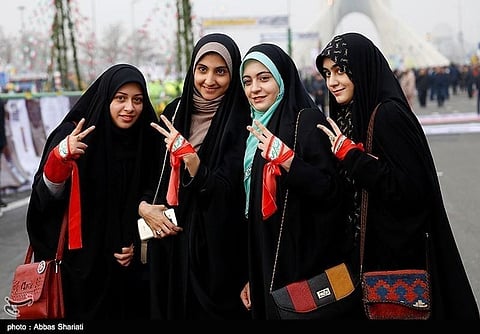
- Home
- न्यूजग्राम
- NewsGram USA
- India
- World
- Politics
- Entertainment
- Culture
- Lifestyle
- Economy
- Sports
- Sp. Coverage
- Misc.
- NewsGram Exclusive
- Jobs / Internships

August 22, 2017 : Unless you have been living under a rock, you would know the magnanimity of the worldwide feminist movement in support of women's rights to be treated as equals irrespective of their nationality, religion or sexual orientation.
Upon comparison to the mainstream Western feminism, mentions of Islamic feminism do not occupy evident, or for what matter, visible part of conversations.
Today, Farghadani, Ghavami and Loujain al-Hathloul have been reduced to mere names on a list of millions of women whose basic rights have been mercilessly desecrated.
But American feminists are yet to speak up about these injustices- they continue to be too occupied with their own victimization to raise voice against the injustices meted out to women like Farghadani.
The Western activist-feminists today are undoubtedly absorbed in struggles to liberate themselves from the grasp of the oppressive male hegemony. However, in their fights against phantom epidemics and unnecessary grievances, the gender activists today have deviated from the real fight against inequality.
In the last two years, Western feminists have often turned to social networking platforms to raise issues, draw attention and mobilize support. While the increasingly global reach of online networking sites like Twitter, and Facebook, and the inherent power of 'hashtag activism' can largely assist women find solidarity , the latest trend has been a far cry from the real cause.
In the last two years, some of the widely used hashtags were #FreeTheNipples, #LesPrincessesOntDesPoils or #PrincessesHaveHair and #BigUndiesOutForSam.
The former was a campaign to de-sexualize women's breasts and the next promotes acceptance of body-hair on women. The third campaign drew support from women in favor of comfortable under-garments for women. Imagine, if the imprisoned Muslim women of Iran and Afghanistan, who lack political rights and are vulnerable to physical violence because of their faith, were to tweet, what would they say about these struggles? Will these be the issues they would raise, I doubt.
The World Economic Forum asserts an inverse relationship between women rights and states with Islam as dominant religion.
The Forum's Global Gender Gap Report 2016 placed Islam as the dominant religion in the lowest ranking 44 states for women rights and equality (that means states un-supportive of womens' rights). Evidently, in states that the report claims most supportive of women rights, the density of Islam followers is very low.
It will be wrong to say that because women in Islamic countries suffer at the hands of misogyny, the Western women should compromise with less serious prejudices. However, what needs to be highlighted is why feminist actions continue to be restricted to physical borders. Women in different corners of the world today have one thing in common – their fight for basic rights as upheld in the Universal Declaration of Human Rights. Why then are the so-called liberal women's rights activists only raising issues of one section of people and not for all?
In the Western liberal societies, the hijab has very recently emerged as a symbol of resistance to Islamophobia, against policies from President Trump's administration aiming to establish divisions between 'them' and 'us'. Western feminists have, since long, defended a woman's right to wear the hijab. However, very little is talked about girls who 'choose' to not don the veil.
In January, Dorsa Derakhshani, an 18-year old Iranian chess grandmaster refused to wear a hijab at a tournament in Gibraltar and instead chose to wear only a headband. Her decision to defy the Iranian law which calls upon all women to wear a headscarf in public drew massive flack from staunch radical Muslims, following which she was kicked out of the national team.
The Somali born Ex-politician and feminist critic, Ayaan Hirsi Ali, who herself wore the burqa as a teenager, strongly believes that the debate over the controversial head covering is no more about religious or cultural practices but about the equality of women. "Expecting half of humanity to go around covered in black sacks is just evil sexism," she had written for a report published in The Australian.
The author has repeatedly expressed her concern over the apathetic stance of western feminists in support of liberal Muslim women for which she has been increasingly labeled as 'Islamophobic'.
However, what needs to be understood here is that raising questions on cultural practices in Islam does not make one Islamophobic.
American philosopher, Martha Craven Nussbaum had rightly pointed out that the feminist theory heeds diminutive consideration to struggles of women outside United States. While this may come across as demeaning to some, that does seem like the present day state of affairs.
The need of the hour is to shatter the dominant opinion which holds that Islam and feminism are not consistent and that one can either be a Muslim or associated with feminism but not both. This, however, can only stem from a larger understanding that human rights- including rights of women, are meant for all and not just a few and definitely must not be restricted by religion.
NewsGram is a Chicago-based non-profit media organization. We depend upon support from our readers to maintain our objective reporting. Show your support by Donating to NewsGram. Donations to NewsGram are tax-exempt.
Click here- www.newsgram.com/donate
